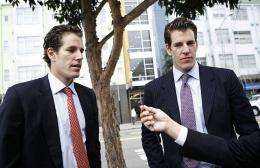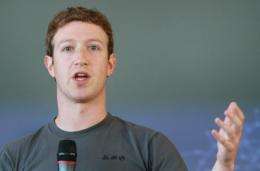ConnectU faces skeptical judges in Facebook appeal

A skeptical panel of judges is mulling whether Facebook founder Mark Zuckerberg duped former Harvard classmates in a $65 million settlement of a lawsuit charging that he stole the idea for the website recently valued at $50 billion.
Twin brothers Tyler and Cameron Winkelvoss claim they enlisted Zuckerberg to finish software code for their ConnectU social-networking website while they were all students at Harvard in 2003.
Zuckerberg, a second year student at the time, took their code and their idea and launched Facebook in February 2004 instead of holding up his end of the deal, according to the brothers. Facebook refutes that account.
Hollywood made the saga famous in the recent hit film "The Social Network."
The twins inked a settlement two years ago that got them $20 million in cash and $45 million worth of stock valued at $36 per share.
The brothers are gambling the settlement, which was supposed to be confidential, on a federal court appeal that contends they were tricked a second time because Facebook internally valued the stock at $9.
Members of a three-judge panel bore holes in the argument pitched by Jerome Falk, the attorney who spoke for the Winklevoss twins during a hearing Tuesday in the Ninth Circuit Court of Appeals in San Francisco.
Judge John Wallace noted that teams of lawyers and a top mediator had worked on the settlement.
"The (ConnectU) founders are pretty smart people themselves," Wallace said.
"The twins also have a father from Wharton School who is very bright," he continued as he grilled Falk.
"If you have all these people to advise you, isn't it difficult to say this is one of those things where you were taken advantage of?" he asked.
The Winkelvoss brothers based the value of Facebook stock on news that months earlier technology giant Microsoft had bought a small piece of the social networking star in a deal that valued the stock at just shy of $36 and the company at $15 billion, Falk said.
He argued that Facebook violated US securities law by not disclosing that it had valued the stock at closer to $9 for stock options issued to employees at that time.
"No one was misled here," he said. "The ConnectU founders struck a deal that made them very rich and is making them richer by the day. No one made them sign it."

Rosenkranz argued that Facebook was under no obligation to volunteer the stock option information during settlement negotiations and that the information was not intentionally withheld.
"It looks like it's got a lot of just about everything you would "This case is about whether sophisticated parties surrounded by a platoon of world-class lawyers can cancel a deal that is binding," Facebook attorney Joshua Rosenkranz countered in his time before the judges. want in a contract," Ninth Circuit chief judge Alex Kozinski said while leafing through the settlement paperwork. "It definitely says we have a binding agreement."
The panel is expected to decide in about three months whether it will overturn a decision by a federal district court denying the appeal.
"They certainly exhibited a healthy degree of skepticism," Falk told AFP after the hearing. "They pressed me on things. I hope I answered to their satisfaction."
If the appeal is rejected, the Winkelvoss brothers would lose the cash and stock, which is in escrow, but would be free to pursue their original lawsuit, according to Falk.
A US probe into Goldman Sachs's fresh $450 million investment in Facebook could drive the hugely popular social networking site to go public earlier than planned.
Goldman evaluated Facebook at a whopping $50 billion, more than longstanding giants such as Boeing, Time Warner and Yahoo!.
Regulators at the US Securities and Exchange Commission are reportedly examining disclosure rules for private firms and might consider compelling Facebook to register as a public company.
Facebook has more than 500 million active users per month worldwide as subscribers "friend" their contacts and share their activities.
(c) 2011 AFP




















